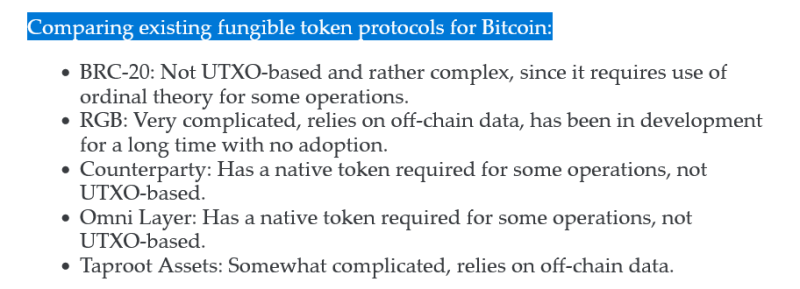Bitcoin Ordinals inventor Casey Rodarmor says a fungible token protocol like Runes wouldn’t leave as much “junk” on the Bitcoin network as that of BRC-20 tokens.

The inventor of Bitcoin Ordinals is proposing a new Bitcoin-based fungible token protocol as a potential alternative to the BRC-20 token standard.
The BRC-20 standard was launched in March by anonymous developer “Domo.” Within two months, the BRC-20 market cap reached $1 billion, with PEPE and ORDI among the most notable BRC-20 tokens created on Bitcoin.
New terrible idea just dropped: Runes.
A worse-is-better fungible token protocol for Bitcoin.https://t.co/TPVrUvWxm8
— Casey (@rodarmor) September 25, 2023
BRC-20 enables the minting and transfer of fungible tokens via the Ordinals protocol on Bitcoin. But the issue with BRC-20 tokens is that they spam Bitcoin with “junk” unspent transaction outputs, or UTXOs, argues Rodarmor.
BRC-20 tokens have the “undesirable consequence of UTXO proliferation,” he explained in a Sept. 25 blog post, proposing Runes as a UTXO-based alternative.
TLDR on Runes – A potential fungible token protocol for Bitcoin
ᚱᚢᚾᛖᛊ
– Casey remains skeptical, citing "99.9% are scams and memes," but recognises they don't appear to be going away.
– Employs a UTXO-based system, notably simpler than BRC-20.
– Uses the letter 'R' in the… https://t.co/zYP43f70gh— Franken (@ItsFranken) September 25, 2023
“If this protocol had a small on-chain footprint and encouraged responsible UTXO management, it might serve as harm reduction compared to existing protocols,” Rodarmor added.
UTXOs represent the amount of cryptocurrency left in a wallet following a completed transaction, where the balance is used in subsequent transactions and is stored in the UTXO database.
Bitcoin’s UTXO model plays a role in making Bitcoin an auditable and transparent ledger by preventing the double-spending problem.
Rodarmor said other fungible token protocols on Bitcoin, such as Really Good for Bitcoin, Counterparty and Omni Layer, have problems of their own.

While Rodarmor admitted 99.9% of fungible tokens are filled with scams and memes, he believes the right fungible token protocol can add value to the Bitcoin network:
Open $100k investment offer in upcoming @BTCFrontierFund accelerator for first team who can get a working (not terrible) Rune indexer, issuance and/or transfer app, up live and running
Don't make the tickers required to be unique, will be a shit show
DM me. Serious offer. pic.twitter.com/6W0IwlhB9x
— trevor.btc (@TO) September 26, 2023
Cointelegraph reached out to Rodarmor for comment but did not receive an immediate response.

